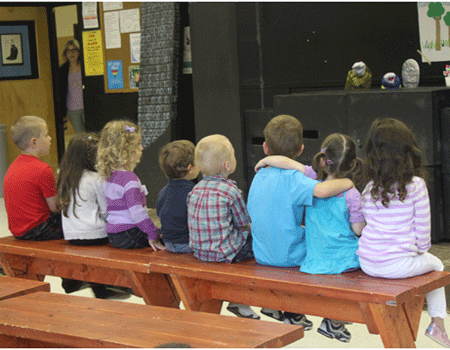THE IMPORTANCE OF LITERACY, LANGUAGE, AND THE ENGLISH CURRICULUM

Literacy is about more than reading or writing – it is about how we communicate in society. It is about social practices and relationships, about knowledge, language and culture.
Those who use literacy take it for granted – but those who cannot use it are excluded from much communication in today's world. Indeed, it is the excluded who can best appreciate the notion of “literacy as freedom”.
- UNESCO, Statement for the United Nations Literacy Decade, 2003–2012
Literacy development is a communal project, and the teaching of literacy skills is embedded across the Ontario curriculum. However, it is the English curriculum that is dedicated to developing the knowledge and skills on which literacy is based – that is, knowledge and skills in the areas of listening and speaking, reading, writing, and viewing and representing.
Language development is central to students' intellectual, social, cultural, and emotional growth and must be seen as a key component of the curriculum. When students learn to use language, they do more than master the basic skills. They learn to value the power of language and to use it responsibly. They learn to express feelings and opinions and to support their opinions with sound arguments and evidence from research. They become aware of the many purposes for which language is used and the diverse forms it can take to serve particular purposes and audiences. They learn to use the formal language appropriate for debates and essays, the narrative language of stories and novels, the figurative language of poetry, the technical language of instructions and manuals. They develop an awareness of how language is used in different formal and informal situations. They come to understand that language is an important medium for communicating ideas and information, expressing world views, and realizing and communicating artistic vision. Students learn that language can be not only used as a tool but also appreciated and enjoyed.
Language is the basis for thinking, communicating, learning, and viewing the world. Students need language skills in order to comprehend ideas and information, to interact socially, to inquire into areas of interest and study, and to express themselves clearly and demonstrate their learning. Learning to communicate with clarity and precision will help students to thrive in the world beyond school.
Language is a fundamental element of identity and culture. As students read and reflect on a rich variety of literary, informational, and media texts,1 they develop a deeper understanding of themselves and others and of the world around them. If they see themselves
and others in the texts they study, they will be more engaged in learning and they will also come to appreciate the nature and value of a diverse, multicultural society. They will develop the ability to understand and critically interpret a range of texts and to recognize that a text conveys one particular perspective among many.
Language skills are developed across the curriculum and, cumulatively, through the grades. Students use and develop important language skills as they read and think about topics, themes, and issues in various subject areas. Language facility helps students to learn in all subject areas, and using language for a broad range of purposes increases both their ability to communicate with precision and their understanding of how language works. Students develop flexibility and proficiency in their understanding and use of language over time. As they move through the secondary school program, they are required to use language with ever-increasing accuracy and fluency in an expanding range of situations. They are also expected to assume responsibility for their own learning and to apply their language skills in more challenging and complex ways.
Taken from the Ontario Ministry of Education Curriculum 9 - 12
“An understanding heart is everything in a teacher, and cannot be esteemed highly enough. One looks back with appreciation to the brilliant teachers, but with gratitude to those who touched our human feeling. The curriculum is so much necessary raw material, but warmth is the vital element for the growing plant and for the soul of the child.”
~ Carl Gustav Jung
Teachers:
Ms. Garda...........................Department Head...........................dilnaz.garda@yrdsb.ca
Mr. Campoli...........................................................................david.campoli@yrdsb.ca
Ms. Korp................................................................................nina.korp@yrdsb.ca
Ms. Liadis..............................................................................zoe.liadis@yrdsb.ca
Mr. Fragomeni.......................................................................vincenzo.fragomeni@yrdsb.ca
Ms. Smurthwaite...................................................................amanda.smurthwaite@yrdsb.ca
Ms. Welch..............................................................................elisa.welch@yrdsb.ca